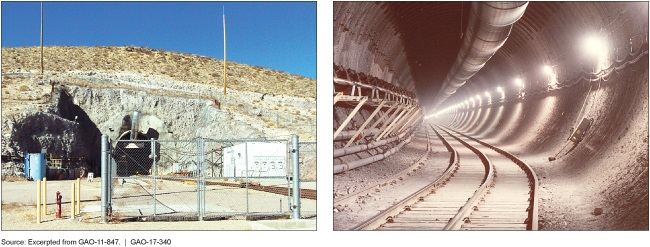Commercial Nuclear Waste: Resuming Licensing of the Yucca Mountain Repository Would Require Rebuilding Capacity at DOE and NRC, Among Other Key Steps
Fast Facts
Power plants in 33 states store nearly 80,000 metric tons of radioactive waste. In 2008, the Department of Energy applied to the Nuclear Regulatory Commission to build an underground repository for this waste at Yucca Mountain in Nevada.
In 2010, DOE reversed course and said Yucca Mountain was no longer a workable option. DOE and NRC then took steps such as eliminating funding and vacating NRC's custom facility for public hearings—making it harder to resume licensing in the future.
We identified 4 key steps that would likely be needed to resume the Yucca Mountain licensing process, including receiving guidance and rebuilding lost capabilities.
North Portal Tunnel Entrance and the Interior of the Main Exploratory Tunnel for the Proposed Yucca Mountain Repository

Photos of outside entrance and interior of main tunnel for proposed Yucca Mountain repository.
Highlights
What GAO Found
After the Department of Energy (DOE) submitted its March 2010 motion to withdraw its license application to construct a geologic repository at Yucca Mountain, DOE and the Nuclear Regulatory Commission (NRC) largely dismantled their capabilities to carry out the rest of NRC's licensing process. This process includes a technical review by NRC staff and adjudication. DOE's and NRC's dismantlement steps included, among other things, eliminating organizations and funding used to carry out the licensing process; canceling the NRC staff's technical review; and vacating NRC's customized hearing facility, which NRC had leased and equipped specifically for the Yucca Mountain adjudication. At the same time, DOE and NRC took steps to preserve relevant data, including millions of documents. DOE and NRC had mostly completed the dismantlement steps before NRC formally suspended the adjudication and the licensing process in September 2011. After an appeals court ruled in 2013 that NRC had acted against federal law by halting its review, from 2014 through 2016, NRC resumed some aspects of the licensing process, such as completing its technical review and report on DOE's Yucca Mountain application, but not the adjudication. As of late 2016 and early 2017, DOE and NRC said they have no formal plans to resume the adjudication, which, according to an NRC estimate from 2014, could take up to 5 years to resume and complete. More recently, the administration announced plans to request funding to resume the licensing.
Based on analysis of documents and interviews, GAO identified four key steps that would likely be needed to resume and complete the licensing process. The steps include actions by, among others, NRC's five-member Commission and the adjudication's parties: DOE, NRC staff, and 17 non-federal parties likely to be affected by the proceeding. The likely key steps GAO identified are:
1. The Commission and parties receiving direction to resume the licensing process, and the Commission deciding on the timing and other details, so NRC and parties can identify their funding needs for the adjudicatio
2. Rebuilding organizational capacity, including, as needed, recruiting personnel to recreate DOE's, NRC's, and nonfederal parties' project offices; obtaining legal, scientific, or other experts for the adjudication; and rebuilding physical infrastructure. Also at this step, DOE and NRC may need to update key documents used for the licensing process.
3. Reconvening the parties and completing the remaining phases of the adjudication, including witness depositions and evidentiary hearings.
4. Carrying out the process's remaining steps, including the Commission's final decision on whether to authorize construction of the repository.
A number of factors could affect the time needed to resume and complete the licensing process. For example, DOE's ability to bring back its expert witnesses to defend its license application during the adjudication could affect this time frame. Because of the volume and complexity of information, former DOE witnesses contacted by GAO generally estimated that it could take a new expert at least a year to prepare to serve as a DOE witness—about twice as long as the former witnesses said they would need themselves.
Why GAO Did This Study
Spent nuclear fuel from commercial power reactors can pose risks to humans and the environment, if not properly contained, and is a source of billions of dollars of liabilities. In 2008, DOE applied to NRC for approval to build a geologic repository at Yucca Mountain in Nevada for permanent disposal of spent nuclear fuel and high-level waste. As part of NRC's licensing process to review DOE's application and potentially approve construction, NRC initiated a public hearing—or adjudication—with DOE, NRC staff, and nonfederal parties. However, in March 2010, after announcing plans to terminate its proposal for Yucca Mountain, DOE submitted a motion to NRC to withdraw its application. In September 2011, NRC formally suspended the adjudication.
GAO was asked to examine the likely steps needed to resume the Yucca Mountain licensing process. This report examines (1) the actions that took place after DOE submitted its motion to withdraw its application and any plans by DOE or NRC to resume the licensing process, and (2) the likely key steps needed to resume and complete the process and the factors that may influence these steps' success.
GAO reviewed federal laws and documents; interviewed DOE and NRC officials and contractors; and interviewed or received written remarks from 15 of the 17 nonfederal parties.
Recommendations
GAO is not making any recommendations. NRC generally agreed with GAO's findings. DOE provided comments but did not indicate whether it agreed with the findings.
